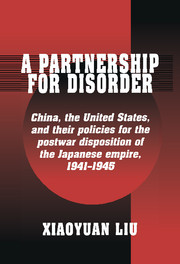 A Partnership for Disorder
A Partnership for Disorder Book contents
- Frontmatter
- Contents
- Acknowledgments
- Note on romanization
- Abbreviations
- Introduction
- 1 The making of an alliance
- 2 The issue of postwar Japan
- 3 China's lost territories
- 4 Korea's independence
- 5 The road to Cairo
- 6 A divisive summit
- 7 Yan'an and postwar East Asia
- 8 Diplomacy without action
- 9 Erosion of a partnership
- 10 The Manchurian triangle
- 11 Bargaining at Moscow
- 12 Epilogue: The crisis of peace
- Appendix I Guiding Plan for Helping the Korean Restoration Movement
- Appendix II Two Chinese documents of the Cairo Conference
- Bibliography
- Index
6 - A divisive summit
Published online by Cambridge University Press: 20 October 2009
- Frontmatter
- Contents
- Acknowledgments
- Note on romanization
- Abbreviations
- Introduction
- 1 The making of an alliance
- 2 The issue of postwar Japan
- 3 China's lost territories
- 4 Korea's independence
- 5 The road to Cairo
- 6 A divisive summit
- 7 Yan'an and postwar East Asia
- 8 Diplomacy without action
- 9 Erosion of a partnership
- 10 The Manchurian triangle
- 11 Bargaining at Moscow
- 12 Epilogue: The crisis of peace
- Appendix I Guiding Plan for Helping the Korean Restoration Movement
- Appendix II Two Chinese documents of the Cairo Conference
- Bibliography
- Index
Summary
In late 1943, there were both favorable and unfavorable developments in the American–Chinese relationship that might affect the atmosphere of their first summit conference. Favorable developments included the Western Allies' agreement to abrogate their old treaties with China earlier in the year and China's inclusion among the signatories of the Moscow Declaration that clarified the leading Allies' general war aims and their intention to cooperate after the war. Both events symbolically lifted China from its traditionally dire diplomatic situation to an equal status with the leading Allied powers. Otherwise, Chongqing continued to perform poorly in the war. The relationship between Chiang Kai-shek and his American chief of staff, General Joseph Stilwell, also became more and more irritating to both governments. These developments formed the background for the summit between Roosevelt and Chiang Kai-shek and made events at Cairo and afterward, in one historian's opinion, “counterpoints of military and political decision-making of [the] highest order.”
Although students of World War II have long been aware that the conference did not improve the Chinese–American military relationship, they have rarely questioned the political achievements of the summit. The conferees' agreement on postwar settlement in East Asia, which would lead to China's recovery of lost territories from Japan and the removal of the Japanese Empire in the Pacific, seemed to reduce their frustrations over the alliance for war. As summarized deftly by one historian, when the British, American, and Chinese military authorities at Cairo still debated.
- Type
- Chapter
- Information
- A Partnership for DisorderChina, the United States, and their Policies for the Postwar Disposition of the Japanese Empire, 1941–1945, pp. 126 - 147Publisher: Cambridge University PressPrint publication year: 1996
